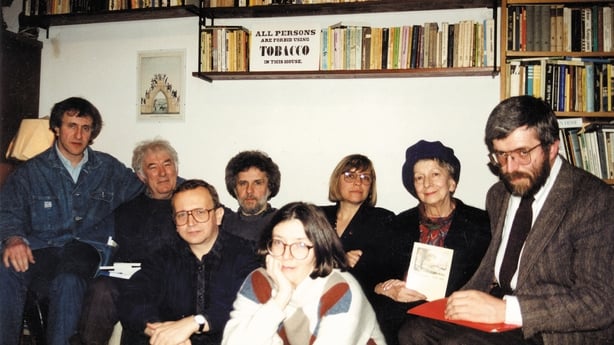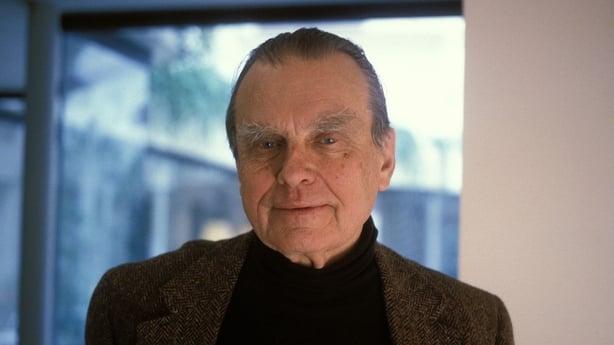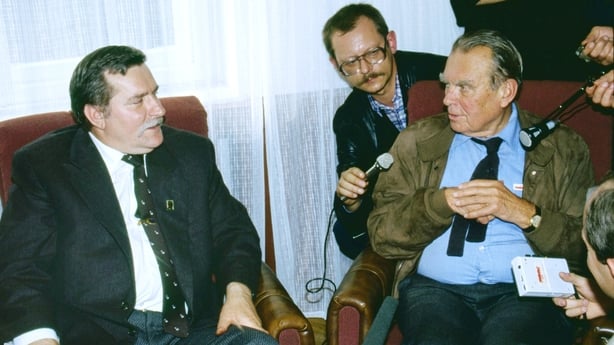"All the family will tell you, he felt a real affinity with Poland," Chris Heaney told RTÉ News, recalling his father Seamus Heaney's trips to Krakow in the 1990s and 2000s.
"Dad was pretty much a non-believer, but the old Catholic traditions, not in the formal church, but the rituals that you grew up in, that you're surrounded by, they were still there [in Poland]."
Today marks ten years since the death of Seamus Heaney, Ireland’s acclaimed poet and Nobel Prize Winner in Literature.
Remembering Seamus Heaney ten years on
Widely read and studied across the English-speaking world, translations of his poetry and essays have also found audiences in countries outside the anglosphere, including Poland.
A visit to Krakow in 1994 to promote a collection of his poetry, entitled '44 poems’, translated into Polish by his friend and fellow Harvard professor Stanislaw Baranczak, became the first of seven visits that Mr Heaney would make to Poland's second city over the course of the next 15 years.
Mr Heaney met a number of Krakow's writers, including Wislawa Szymborska, a Polish poet, who, in 1996, would be awarded the Nobel Prize in Literature, one year after Mr Heaney’s award.
Long friendships were formed with those he met on that first visit.

Describing Krakow's poetry scene in 'Stepping Stones', Mr Heaney recalled that, "the mixture of closely-knit friendships and commitment to poetry reminded me of Belfast in the 1960s".
Mr Heaney’s wife, Marie, accompanied him on later visits to Krakow, and a translated Polish edition of her book on Irish legends, ‘Over Nine Waves’ was published alongside his essay collection ‘The Redress of Poetry’ and a volume of poems, ‘The Spirit Level’, by his Polish publisher and friend, Jerzy Illg.
"Heaney was extremely important for Krakow, and very much present in the poetic, literary landscape of the city since he first came in 1994, before the Nobel," Magdalena Heydel, a Polish translator of Mr Heaney's later work, told RTÉ News.
In 2005, upon receiving an honorary doctorate from Krakow’s Jagiellonian University, the Derry-born poet said: "I found consolation in the poems of other poets of my language, but in someone else’s beauty, in Polish poetry, in Polish poets, almost salvation."
Mr Heaney’s interest in Polish poetry stemmed back to the 1960s when he read a translated anthology of Polish poetry, edited by Czeslaw Milosz, Poland’s foremost poet of the 20th century, and the recipient of the Nobel Prize in Literature in 1980.
Mr Milosz's life and vast volume of work, in poetry and prose, reflected Poland’s tumultuous history during the 20th century. Themes of identity, morality and the weight of history and conflict pervaded his texts.
His 1953 collection of essays, 'The Captive Mind', detailed his life as an artist in Poland's post-war totalitarian state.
Both poets met for the first time in 1983 when Mr Heaney was teaching creative writing in California. Mr Milosz, almost 30 years Mr Heaney’s senior, was a professor of Slavic languages and literature at the University of California, Berkeley.
In ‘Stepping Stones’, Mr Heaney remarked that he was "always a bit in awe" of Mr Milosz. That sense of awe developed into a long friendship between two great poets.

Born into a Polish noble family in rural Lithuania in 1911 (then part of the Russian Empire), Mr Milosz grew up in an independent Poland following World War I, later studying law at university in Vilnius, then part of Poland.
The young poet lived in Warsaw during World War II, and survived the city’s near-total destruction during the Warsaw Uprising of 1944.
After the war, he joined the diplomatic service of Poland’s post-war Communist government. Fearing arrest, he claimed asylum in Paris in 1951, and emigrated to the US in 1960.
Decades in exile were not to be wasted. His position at Berkeley afforded him the possibility to continue publishing his poetry which, translated into English, found a wider audience.
His work remained banned in Poland by the country’s Communist authorities until 1980, the year of his Nobel Prize award.
In a sign of his fame at home, shipyard workers in Gdansk placed two quotes on a monument to honour co-workers slain by state police during protests: one was from the Bible, the other, a passage from his poem, 'You Who Wronged'.
* Do not feel safe. The poet remembers.
You can kill one, but another is born.
The words are written down, the deed, the date.
In 1993, aged 82, Mr Milosz returned to Poland to live in Krakow with his American wife, Carol.
That same year, the Polish poet visited the Heaney family home in Sandymount during a visit to Ireland.
Ms Heydel, who translated a selection of Mr Heaney’s essays from ‘Finder’s Keepers’, said that both writers journeyed from "village boy to a world class intellectual and poet".
"Both of them wrote a kind of classical poetry, not experimental, not linguistic, but centred on ideas and images," she said.

When Mr Milosz died in 2004, Mr Heaney travelled to Krakow for the state funeral.
"I had to come," Mr Heaney told his friend and publisher Jerzy Illg.
One month after Mr Heaney's death in 2013, writers and translators from Krakow's literary circles gathered to remember him.
In memory of the friendship between the two writers, and to forge links between Irish and Polish literature, the Heaney-Milosz Residency has been created by the Estate of Seamus Heaney, the Krakow Festival Office and the Embassy of Ireland in Poland.
Irish-American poet Alice Lyons, who teaches creative writing and literature at ATU Sligo, is the inaugural recipient of the award.
From mid-October, Ms Lyons will spend six weeks living in Mr Milosz's former apartment in Krakow, focusing on her own writing and attending meetings with writers from the city's literary groups.
Speaking to RTÉ News, Ms Lyons said she was "really looking forward" to starting her residency.
She first encountered Polish poetry in the mid-1980s when she read a collection of Wislawa Szymborska's poems, and described Mr Milosz's work as a "tuning fork for Heaney".
"The idea of being able to stay in his apartment, and then to use that to give people space to write, is kind of incredible," said Chris Heaney.
* Passage from Czeslaw Milosz's 'You Who Wronged' / 'Który skrzywdziłeś' in original Polish:
Nie bądź bezpieczny. Poeta pamięta.
Możesz go zabić - narodzi się nowy.
Spisane będą czyny i rozmowy.







